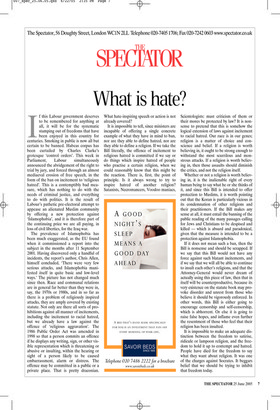What is hate?
If this Labour government deserves to be remembered for anything at all, it will be for the systematic stamping out of freedoms that have been enjoyed in this country for centuries. Smoking in public is now all but certain to be banned. Habeas corpus has been curtailed by Charles Clarke’s grotesque ‘control orders’. This week in Parliament, Labour simultaneously announced the abridgement of the right to trial by jury, and forced through an almost mediaeval erosion of free speech, in the form of the ban on incitement to ‘religious hatred’. This is a contemptibly bad measure, which has nothing to do with the needs of criminal justice, and everything to do with politics. It is the result of Labour’s pathetic pre-electoral attempt to appease an alienated Muslim community by offering a new protection against ‘Islamophobia’, and it is therefore part of the continuing price we are all paying, in loss of civil liberties, for the Iraq war.
The prevalence of Islamophobia has been much exaggerated, as the EU found when it commissioned a report into the subject in the months after 11 September 2001. Having discovered only a handful of incidents, the report’s author, Chris Allen, himself concluded, ‘There were very few serious attacks, and Islamophobia manifested itself in quite basic and low-level ways.’ The picture has not changed much since then. Race and communal relations are in general far better than they were in, say, the 1970s or 1980s, and in so far as there is a problem of religiously inspired attacks, they are amply covered by existing statute. Not only are there all sorts of prohibitions against all manner of incitements, including the incitement to racial hatred, but we already have a law against the offence of ‘religious aggravation’. The 1986 Public Order Act was amended in 1998 so that a person commits an offence if he displays any writing, sign, or other visible representation which is threatening or abusive or insulting, within the hearing or sight of a person likely to be caused embarrassment, alarm or distress. The offence may be committed in a public or a private place. That is pretty draconian. What hate-inspiring speech or action is not already covered?
It is impossible to tell, since ministers are incapable of offering a single concrete example of what they have in mind to ban, nor are they able to define hatred, nor are they able to define a religion. If we take the Bill literally, the offence of incitement to religious hatred is committed if we say or do things which inspire hatred of people who practise a certain religion, when we could reasonably know that this might be the reaction. There is, first, the point of principle. Is it always wrong to try to inspire hatred of another religion? Satanists, Necromancers, Voodoo maniacs, Scientologists: must criticism of them or their mores be protected by law? It is nonsense to pretend that this is somehow the logical extension of laws against incitement to racial hatred. Our race is in our genes; religion is a matter of choice and conscience and belief. If a religion is worth believing in, it ought to be strong enough to withstand the most scurrilous and monstrous attacks. If a religion is worth believing in, then those assaults should diminish the critics, and not the religion itself.
Whether or not a religion is worth believing in, it is the inalienable right of every human being to say what he or she thinks of it, and since this Bill is intended to offer protection to Muslims, it is worth pointing out that the Koran is particularly vicious in its condemnation of other religions and their practitioners. If the Bill makes any sense at all, it must entail the banning of the public reading of the many passages calling for Jews and Christians to be despised and killed — which is absurd and paradoxical, given that the measure is intended to be a protection against Islamophobia.
If it does not mean such a ban, then the Bill is nonsense and should be scrapped. If we say that this Bill would not have any force against such blatant incitements, and if we say that we will all be able to continue to insult each other’s religions, and that the Attorney-General would never dream of actually using this piece of law, then that in itself will be counterproductive, because its very existence on the statute book may provoke disorder and unrest from those who believe it should be vigorously enforced. In other words, this Bill is either going to encourage censorship and self-censorship, which is abhorrent. Or else it is going to raise false hopes, and inflame even further the resentment of those who feel that their religion has been insulted.
It is impossible to make an adequate distinction between the freedom to satirise, ridicule or lampoon religion, and the freedom to hold it up to contempt and hatred. People have died for the freedom to say what they want about religion. It was one of the charges against Socrates. It beggars belief that we should be trying to inhibit that freedom today.


































































 Previous page
Previous page